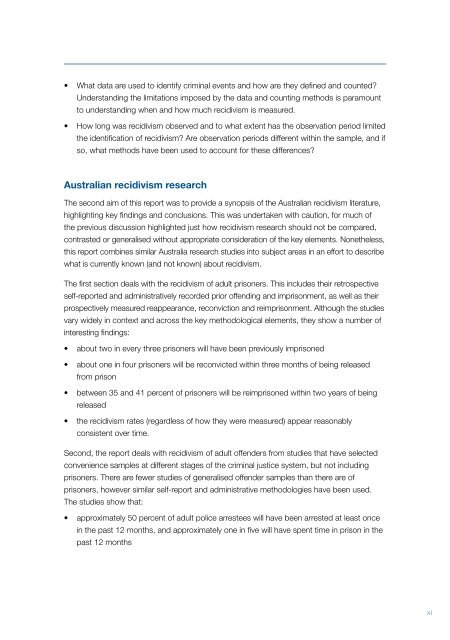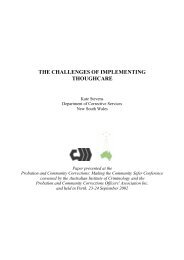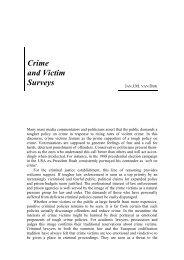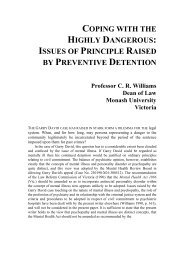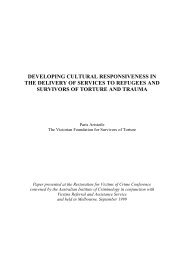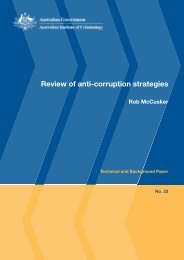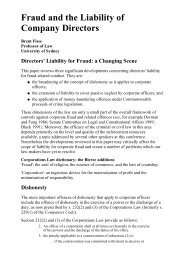Recidivism in Australia : findings and future research - Australian ...
Recidivism in Australia : findings and future research - Australian ...
Recidivism in Australia : findings and future research - Australian ...
You also want an ePaper? Increase the reach of your titles
YUMPU automatically turns print PDFs into web optimized ePapers that Google loves.
•<br />
•<br />
What data are used to identify crim<strong>in</strong>al events <strong>and</strong> how are they def<strong>in</strong>ed <strong>and</strong> counted?<br />
Underst<strong>and</strong><strong>in</strong>g the limitations imposed by the data <strong>and</strong> count<strong>in</strong>g methods is paramount<br />
to underst<strong>and</strong><strong>in</strong>g when <strong>and</strong> how much recidivism is measured.<br />
How long was recidivism observed <strong>and</strong> to what extent has the observation period limited<br />
the identification of recidivism? Are observation periods different with<strong>in</strong> the sample, <strong>and</strong> if<br />
so, what methods have been used to account for these differences?<br />
<strong>Australia</strong>n recidivism <strong>research</strong><br />
The second aim of this report was to provide a synopsis of the <strong>Australia</strong>n recidivism literature,<br />
highlight<strong>in</strong>g key f<strong>in</strong>d<strong>in</strong>gs <strong>and</strong> conclusions. This was undertaken with caution, for much of<br />
the previous discussion highlighted just how recidivism <strong>research</strong> should not be compared,<br />
contrasted or generalised without appropriate consideration of the key elements. Nonetheless,<br />
this report comb<strong>in</strong>es similar <strong>Australia</strong> <strong>research</strong> studies <strong>in</strong>to subject areas <strong>in</strong> an effort to describe<br />
what is currently known (<strong>and</strong> not known) about recidivism.<br />
The first section deals with the recidivism of adult prisoners. This <strong>in</strong>cludes their retrospective<br />
self-reported <strong>and</strong> adm<strong>in</strong>istratively recorded prior offend<strong>in</strong>g <strong>and</strong> imprisonment, as well as their<br />
prospectively measured reappearance, reconviction <strong>and</strong> reimprisonment. Although the studies<br />
vary widely <strong>in</strong> context <strong>and</strong> across the key methodological elements, they show a number of<br />
<strong>in</strong>terest<strong>in</strong>g f<strong>in</strong>d<strong>in</strong>gs:<br />
•<br />
•<br />
•<br />
•<br />
about two <strong>in</strong> every three prisoners will have been previously imprisoned<br />
about one <strong>in</strong> four prisoners will be reconvicted with<strong>in</strong> three months of be<strong>in</strong>g released<br />
from prison<br />
between 35 <strong>and</strong> 41 percent of prisoners will be reimprisoned with<strong>in</strong> two years of be<strong>in</strong>g<br />
released<br />
the recidivism rates (regardless of how they were measured) appear reasonably<br />
consistent over time.<br />
Second, the report deals with recidivism of adult offenders from studies that have selected<br />
convenience samples at different stages of the crim<strong>in</strong>al justice system, but not <strong>in</strong>clud<strong>in</strong>g<br />
prisoners. There are fewer studies of generalised offender samples than there are of<br />
prisoners, however similar self-report <strong>and</strong> adm<strong>in</strong>istrative methodologies have been used.<br />
The studies show that:<br />
•<br />
approximately 50 percent of adult police arrestees will have been arrested at least once<br />
<strong>in</strong> the past 12 months, <strong>and</strong> approximately one <strong>in</strong> five will have spent time <strong>in</strong> prison <strong>in</strong> the<br />
past 12 months<br />
xi


